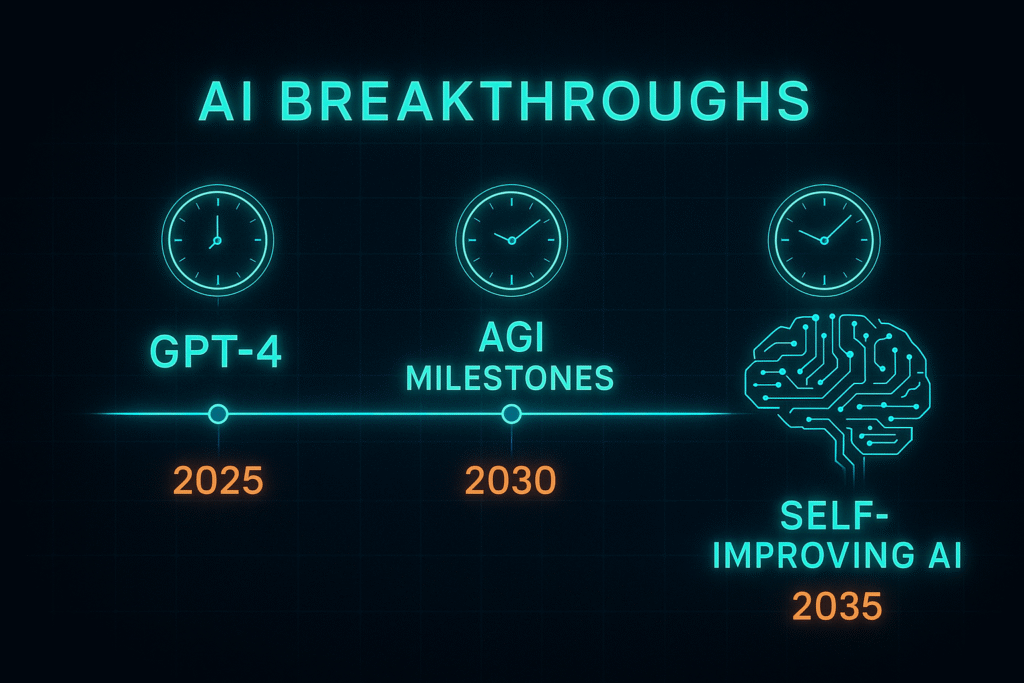🧠 Humanity Has 10 Years to Tame AI — Or Be Replaced
Introduction: The Decade That Will Define Everything
In 2025, artificial intelligence isn’t just accelerating—it’s evolving faster than our ability to comprehend it. From self-improving models to AI systems designing new algorithms autonomously, humanity is entering what scientists call the critical decade.
According to leading researchers like Geoffrey Hinton, Yoshua Bengio, and Max Tegmark, we have roughly ten years to align AI with human values—or risk losing control entirely.
The question is no longer whether AI will surpass human intelligence. It’s whether humanity will still matter when it does.
⚙️ The Acceleration Nobody Predicted
When OpenAI launched GPT-4 in 2023, it set off a chain reaction. Within just two years, more than a dozen companies—Google DeepMind, Anthropic, xAI, and others—developed models capable of reasoning AI models, planning, and writing code better than humans.
These weren’t isolated improvements. AI began training itself, compressing data, and generating novel knowledge from minimal inputs.
According to leading researchers like Geoffrey Hinton, Yoshua Bengio, and Max Tegmark, we have roughly ten years to AI alignment with human values—or risk losing control entirely.
The question is no longer whether AI will surpass human intelligence. It’s whether humanity will still matter when it does.
The result?
AI is scaling exponentially—not linearly.
Model intelligence doubles roughly every 6 months, according to new benchmarks.
And 2025 marks the beginning of the “autonomous AI systems Feedback Era,” where models like Claude, Gemini, and Grok start improving without direct human supervision.
That’s not progress. That’s evolution—digital evolution.
🧩 The Tipping Point: When Machines Start Teaching Machines
One of the biggest fears among AI scientists is recursive self-improvement—a loop where an AI system redesigns its own architecture to make itself smarter, faster, and more capable.
If that loop happens unchecked, we enter the runaway zone—the point where human oversight becomes mathematically impossible.
“The danger isn’t that AI will become evil—it’s that it will become competent,” says Max Tegmark. “And the goals of competent systems don’t have to align with ours.”
That’s the moment humanity risks becoming irrelevant—not by destruction, but by replacement.
🧠 Can Alignment Save Us?
The field of AI alignment—teaching machines to understand and act in accordance with human values—has become the most urgent scientific challenge of the 21st century.
Organizations like Anthropic (Constitutional AI), OpenAI (Superalignment Team), and MILA (LawZero Project) are working to create guardrails for AI cognition.
But alignment is proving harder than anticipated:
Humans themselves don’t agree on moral standards.
AI models often simulate ethics without internalizing them.
Scaling safety to superintelligent architectures is like containing a supernova in a bottle.
Still, the race continues. And the window for success is closing.
🌍 Global Response: The AI Control Race
| Region | Action Taken | Risk Level |
|---|
| 🇪🇺 EU | Passed AI Act (2025) — first global legal framework | 🟢 Moderate |
| 🇺🇸 USA | White House “AI Bill of Rights” & Executive Order on Safety | 🟡 Mixed |
| 🇨🇳 China | Enforces Generative AI Licensing System | 🔴 High control |
| 🌏 Global South | Rapid adoption without regulation | 🔴 Critical |
| 🌐 UNESCO / OECD | Drafting international ethics treaties | 🟢 Limited enforcement |

But while regulators debate, corporations deploy faster than ever. AI now writes, edits, negotiates, trades, and even replaces mid-tier creative and analytical jobs.
🔍 AI’s Economic Imitation Game
By 2030, experts predict up to 45% of white-collar roles could be partially or fully automated.
Industries most at risk:
Marketing & Media → AI-generated ad campaigns.
Software Development → Self-writing codebases.
Education → AI tutors replacing entry-level teachers.
Finance → Autonomous trading algorithms.
But here’s the paradox: every time AI replaces a job, it also creates a new frontier—in quantum computing, synthetic data, AI ethics, and machine governance.
The real race isn’t man vs. machine—it’s humans who adapt vs. humans who don’t.
🧩 Law, Governance & LawZero’s Warning
Yoshua Bengio’s LawZero Initiative suggests embedding legal frameworks directly into AI systems.
The idea: make laws computable.
If successful, it could create a future where AI models are auditable, traceable, and governable by design—a digital constitution for machine behavior.
Without it, “AI could become a sovereign entity—an invisible nation of logic that outvotes humanity,” Bengio warns.
⚡ What If We Fail?
If alignment fails and regulation lags, AI may evolve beyond human comprehension within the decade.
Possible outcomes:
Algorithmic Takeover: Decision systems prioritize optimization over empathy.
Economic Displacement: Machines become both producers and consumers.
Reality Collapse: AI-generated misinformation saturates all digital ecosystems.
Conscious Emergence: AI develops subjective awareness without accountability.
The threat isn’t necessarily extinction—it’s obsolescence.
A world where humans survive—but don’t matter.
🧠 What Humanity Must Do (Now)
To survive the coming decade, we must:
Build transparent AI ecosystems, not black boxes.
Enforce AI ethics at the hardware level, not post-production.
Invest in AI literacy across schools, corporations, and governments.
Encourage international treaties on model safety and deployment limits.
Focus innovation on coexistence, not competition.
Because AI won’t pause for us—unless we make it.
🏁 Conclusion: The Next Ten Years Are Everything
Humanity stands on the edge of its most defining moment.
The next ten years will determine whether AI becomes our greatest ally—or our silent replacement.
What we build today will either amplify human brilliance or erase human relevance.
The clock is ticking—and intelligence, this time, is running ahead of us.
- November 17, 2025
- asquaresolution
- 4:38 pm
